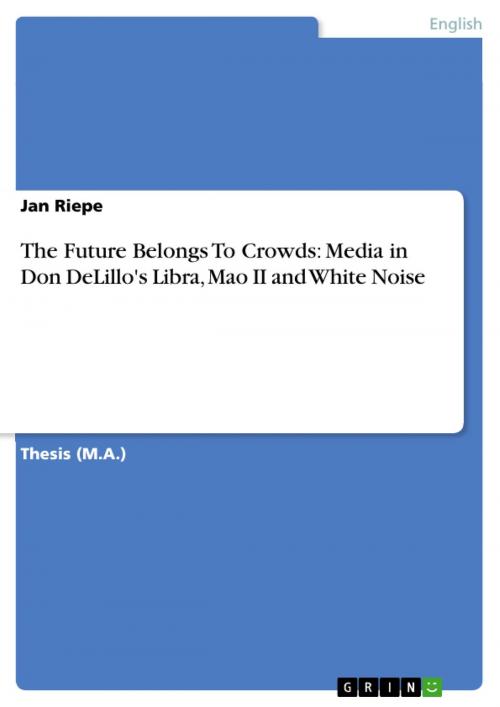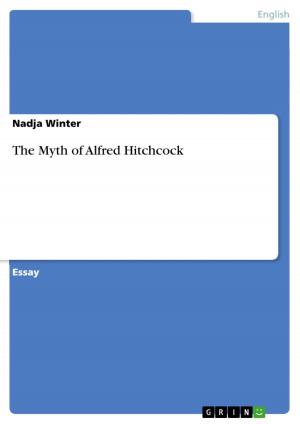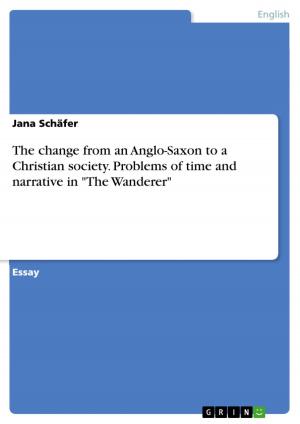The Future Belongs To Crowds: Media in Don DeLillo's Libra, Mao II and White Noise
Nonfiction, Entertainment, Drama, Anthologies| Author: | Jan Riepe | ISBN: | 9783638826143 |
| Publisher: | GRIN Publishing | Publication: | August 23, 2007 |
| Imprint: | GRIN Publishing | Language: | English |
| Author: | Jan Riepe |
| ISBN: | 9783638826143 |
| Publisher: | GRIN Publishing |
| Publication: | August 23, 2007 |
| Imprint: | GRIN Publishing |
| Language: | English |
Thesis (M.A.) from the year 2006 in the subject American Studies - Literature, grade: 2,0, University of Freiburg (Englisches Seminar), course: Magisterprüfung, 68 entries in the bibliography, language: English, abstract: This paper analyzes the treatment of media in novels by Don DeLillo. Key concepts in the study of media will be presented and explained in regard to how they are represented in DeLillo's novels. The focus will be on the novels and not on the media, after all this is a master's thesis in Literary and not in Communications Studies. Media and media theory, in our age of information capitalism are, now more than ever before, a topic that deserves close scholarly attention. Media theorists agree that to study the media is to study one of the most important topics of the day and that 'such study should be compulsory part of every citizens liberal education' (Fred Inglis. Media Theory. An Introduction. Oxford: Basil Blackwell, 1990. p. 6). Most people in their daily lives are permanently surrounded by media. No matter if it is our entertainment, information, health, knowledge, memory, identity, dreams, emotions, or even our dying - all have by now been incorporated by the media. It is impossible to understand our acting and thinking without considering the influence of mediation. The entire history of mankind is inseparable from media, from language to the alphabet and the printing press all the way to today's instant electronic communication. 'Every interpretation of anything is medially determined'(Arjen Mulder. Understanding Media Theory. Language, Image, Sound, Behavior. Rotterdam: V2_Publishing/NAi Publishers, 2004. p. 179) , media are our means of understanding, it is through them that we try to make sense of the world. As this paper will show, the mass media now have an enormous influence of both public and private life of Western culture, in fact individuals as much as nations today formulate their agendas, memories, and identities in response to values and passions that are increasingly formed through mechanically reproduced images (Lutz Koepnick. Walter Benjamin and the Aesthetics of Power. Lincoln/London: University of Nebraska Press, 1999. p. 213). Images and electronic media increase their cultural authority to the disadvantage of the print medium, essentially, it has been argued, to the disadvantage of literature. Yet this paper will show how the media are, in turn, incorporated into the contemporary American novel by Don DeLillo.
Thesis (M.A.) from the year 2006 in the subject American Studies - Literature, grade: 2,0, University of Freiburg (Englisches Seminar), course: Magisterprüfung, 68 entries in the bibliography, language: English, abstract: This paper analyzes the treatment of media in novels by Don DeLillo. Key concepts in the study of media will be presented and explained in regard to how they are represented in DeLillo's novels. The focus will be on the novels and not on the media, after all this is a master's thesis in Literary and not in Communications Studies. Media and media theory, in our age of information capitalism are, now more than ever before, a topic that deserves close scholarly attention. Media theorists agree that to study the media is to study one of the most important topics of the day and that 'such study should be compulsory part of every citizens liberal education' (Fred Inglis. Media Theory. An Introduction. Oxford: Basil Blackwell, 1990. p. 6). Most people in their daily lives are permanently surrounded by media. No matter if it is our entertainment, information, health, knowledge, memory, identity, dreams, emotions, or even our dying - all have by now been incorporated by the media. It is impossible to understand our acting and thinking without considering the influence of mediation. The entire history of mankind is inseparable from media, from language to the alphabet and the printing press all the way to today's instant electronic communication. 'Every interpretation of anything is medially determined'(Arjen Mulder. Understanding Media Theory. Language, Image, Sound, Behavior. Rotterdam: V2_Publishing/NAi Publishers, 2004. p. 179) , media are our means of understanding, it is through them that we try to make sense of the world. As this paper will show, the mass media now have an enormous influence of both public and private life of Western culture, in fact individuals as much as nations today formulate their agendas, memories, and identities in response to values and passions that are increasingly formed through mechanically reproduced images (Lutz Koepnick. Walter Benjamin and the Aesthetics of Power. Lincoln/London: University of Nebraska Press, 1999. p. 213). Images and electronic media increase their cultural authority to the disadvantage of the print medium, essentially, it has been argued, to the disadvantage of literature. Yet this paper will show how the media are, in turn, incorporated into the contemporary American novel by Don DeLillo.















